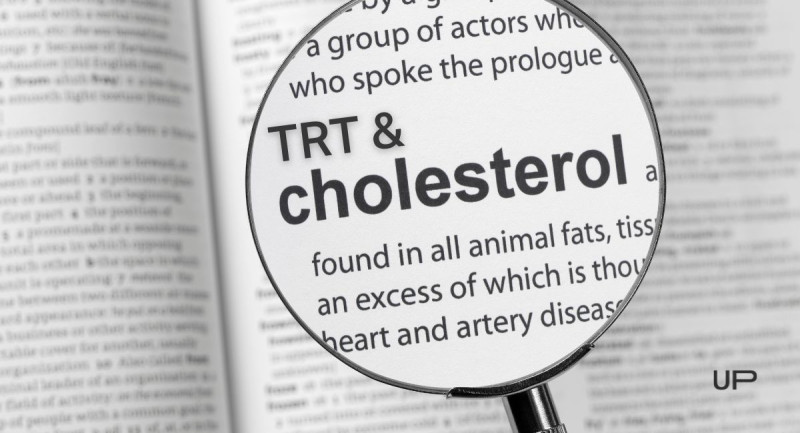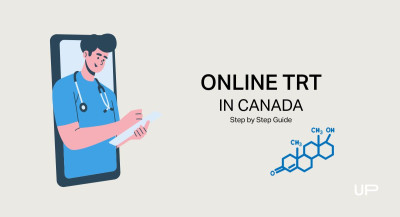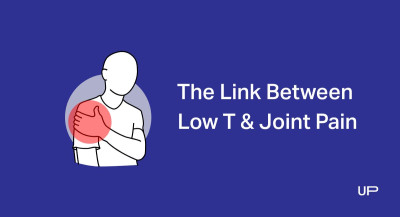How TRT Affects Cholesterol And Heart Health: What The Latest Research Shows


Heart health is one of the most discussed topics among men considering testosterone replacement therapy (TRT) in Canada, where cardiovascular disease remains a leading health concern.

For years, there has been uncertainty about whether TRT improves or harms heart health, particularly in relation to cholesterol and blood lipid levels.
Testosterone influences how the body processes fats, including LDL (bad cholesterol), HDL (good cholesterol), and triglycerides, all of which play a key role in cardiovascular risk.
As new research emerges, including major clinical studies conducted in recent years, the picture is becoming much clearer: when properly prescribed and monitored, TRT in Canada can support healthier lipid balance and overall cardiovascular stability for men with low testosterone.
Topics covered in this article:
- Key Takeaways (1-Minute Summary)
- The Link Between Testosterone and Cholesterol
- Does TRT Improve or Worsen Lipid Levels?
- TRT and Heart Health: What the Latest Research Really Shows
- Beyond Cholesterol: Blood Pressure, Inflammation, and Arteries
- Who Should Be Cautious or Closely Monitored
- Canadian Clinical Perspective: Monitoring and Safety Standards
- Frequently Asked Questions
- Conclusion
- References
Key Takeaways (1-Minute Summary)
- Testosterone affects cholesterol metabolism, influencing LDL, HDL, and triglyceride levels that are linked to heart health.
- Recent clinical trials, including the TRAVERSE study, found that TRT does not increase the risk of heart attack or stroke when prescribed and monitored correctly.
- Most men on TRT see neutral or slightly improved lipid profiles, especially when therapy restores testosterone to normal physiological levels.
- Unsupervised or excessive dosing can alter cholesterol balance and increase cardiovascular strain, underscoring the need for medical oversight.
- In Canada, testosterone replacement therapy (TRT) is prescribed with careful cardiovascular screening and follow-up testing to ensure both hormonal and heart health remain stable over time.

The Link Between Testosterone and Cholesterol
Testosterone plays a critical role in lipid metabolism, acting as a hormonal brake on fat storage and a promoter of lean mass and healthy circulation. Men whose testosterone levels fall below the normal range often experience higher LDL (bad cholesterol), elevated triglycerides, and diminished HDL (good cholesterol). Several mechanisms explain this connection: testosterone helps increase lipoprotein lipase activity (which clears triglycerides), supports insulin sensitivity, and influences how the liver processes lipids. When you begin medically supervised testosterone replacement therapy (TRT) in Canada, you are essentially restoring this natural hormone balance. Studies show that in many cases, TRT leads to small but meaningful improvements in lipid profiles, though individual results vary based on dosage, lifestyle, and metabolic health.
Does TRT Improve or Worsen Lipid Levels?
Testosterone replacement therapy (TRT) affects the body’s lipid profile, which refers to the different types of fats circulating in your blood. Understanding these terms helps make sense of how TRT interacts with cholesterol and heart health.
What Major Studies and Reviews Report
- Large, high-quality trials such as the TRAVERSE study found that TRT was noninferior to placebo for major heart events like heart attack and stroke, meaning it did not increase cardiovascular risk when properly monitored.
- Multiple reviews and meta-analyses have reported small but favourable improvements in blood lipids for men with low testosterone. The most consistent changes include lower triglycerides and total cholesterol, while effects on LDL and HDL are modest and vary between studies.
Typical Changes Observed With TRT
- Triglycerides: These are a type of fat stored in the body and used for energy. High triglyceride levels can raise the risk of heart disease. TRT often helps reduce triglycerides slightly, especially when combined with improved fitness and lower body fat.
- Total cholesterol: This measures the overall amount of cholesterol in your blood, including both LDL and HDL. High total cholesterol can indicate an increased cardiovascular risk. Many studies show that TRT modestly lowers total cholesterol levels as hormone balance improves.
- LDL (low-density lipoprotein): Often called “bad cholesterol,” LDL can build up in artery walls and contribute to plaque formation. Some studies show small decreases in LDL during TRT, while others find neutral results. Keeping LDL within a healthy range is key for long-term heart protection.
- HDL (high-density lipoprotein): Known as “good cholesterol,” HDL helps remove excess cholesterol from the bloodstream. Some men see little change in HDL while others experience a slight drop, but this effect is typically minor and not linked to higher cardiovascular risk when TRT is supervised by a healthcare provider.
Why Dosing and Delivery Method Matter
- TRT should keep testosterone levels within the normal physiological range. Taking too much or using non-medical sources can disrupt lipid metabolism and blood pressure, which increases cardiovascular strain.
- Formulation type can also influence results. Injectable testosterone may cause short-term hormone peaks, while gels or patches provide steadier levels. The right option depends on individual response, lab results, and personal comfort.
- Monitoring and dosage adjustments help maintain both hormonal and cardiovascular stability. This is standard practice for TRT in Canada, where doctors routinely track testosterone, cholesterol, and blood pressure.
Bottom Line
When used responsibly and monitored by a licensed healthcare provider, TRT tends to have neutral or mildly positive effects on cholesterol. The clearest improvement is often seen in triglycerides, while LDL and HDL remain stable. Consistent monitoring ensures the therapy supports heart health without increasing risk.

TRT and Heart Health: What the Latest Research Really Shows
If you’ve been thinking about starting testosterone replacement therapy (TRT) in Canada but worry about your heart, you’re not alone. A lot of the confusion comes from older studies that didn’t clearly separate men with true testosterone deficiency from those who didn’t need treatment. The good news? The most recent large-scale trial gives reassuring findings, especially when TRT is used correctly.
What the Big Trial Found
In the landmark trial known as TRAVERSE Trial, over 5,200 men aged 45-80 with known or high risk of heart disease were treated with daily testosterone gel or placebo, then followed for about 33 months. The results showed that TRT did not increase the rate of major heart events—heart attack, stroke or death—when compared to placebo (7.0% vs. 7.3%). It’s the strongest evidence yet that, for men with genuine low testosterone, therapy can be safe for the heart when managed by a doctor.
Why This Doesn’t Mean Zero Risk
Although the overall risk of bad heart events didn’t increase, the same trial did find some signals worth noting—slightly higher rates of atrial fibrillation and pulmonary embolism in the treatment group. That doesn’t mean TRT caused these in most men, but it does mean that screening and monitoring matter. Think of it like this: TRT is not a “free pass” for no risk; it shifts the balance so treatment becomes safer than unmanaged low-T, but you still need to keep tabs on your heart health.
What This Means for Men in Canada
In the Canadian context, you’re already getting a safety advantage because TRT is prescribed only with lab-confirmed low testosterone and ongoing follow-up. That means:
- You likely get checked for blood pressure, cholesterol and heart disease risk before starting.
- Your testosterone dose is adjusted to keep your levels within a normal physiological range—too high is one of the main “what-if” problems.
- You’ll have periodic lab work to check not just hormone levels but also how your heart and metabolism are responding.
In plain terms, when TRT is done right, the heart-health risk does not appear to be higher than not treating low testosterone. That means the potential benefits (better mood, muscle, recovery, energy) do not necessarily come with a trade-off of increased heart risk.

Beyond Cholesterol: Blood Pressure, Inflammation, and Arteries
When it comes to testosterone and heart health, cholesterol is only one part of the story. The heart and blood vessels are influenced by many other factors, including blood pressure, inflammation, and how well arteries stay flexible over time. Testosterone plays a subtle but important role in each of these systems, which is why the overall effect of TRT depends on keeping hormone levels balanced, not simply “higher.”
Blood Pressure and Circulation
Some men worry that TRT automatically raises blood pressure, but that’s not always true. Studies show mixed results:
- In men with normal testosterone levels, adding extra testosterone can raise blood pressure slightly.
- In men with clinically low testosterone, restoring levels often leads to better vascular function and more stable readings.
- Lifestyle factors—like hydration, salt intake, and body weight—still play a much bigger role in blood pressure than TRT alone.
In Canada, routine blood pressure monitoring is part of every supervised TRT program. If your readings increase, your provider can adjust your dose or check for other causes.
Inflammation and Arterial Health
Low testosterone has been linked with higher markers of inflammation, such as C-reactive protein (CRP). Chronic inflammation can stiffen arteries and contribute to plaque buildup. Research suggests that men treated for low testosterone often see reductions in inflammatory markers, likely because TRT improves body composition, energy, and metabolic health.
Healthy arteries are flexible and responsive. When testosterone levels are balanced, blood vessels can dilate more efficiently, helping oxygen reach muscles and organs. This effect may help explain why many men on stable TRT report better stamina, recovery, and overall cardiovascular fitness.
The Takeaway
TRT is not a substitute for heart-healthy habits, but it can complement them. By improving muscle mass, reducing fat, and helping regulate blood sugar and inflammation, balanced testosterone levels can support a healthier cardiovascular system. The key is professional oversight—monitoring ensures that your heart, blood pressure, and hormone levels stay in sync.
Who Should Be Cautious or Closely Monitored
While testosterone replacement therapy (TRT) is generally safe when prescribed for true hormone deficiency, some men need closer monitoring to protect their heart and overall health. This does not mean TRT is unsafe; it simply means certain health conditions require extra attention during treatment.
Men With Pre-Existing Heart Conditions
If you already have heart disease, a history of stroke, or uncontrolled high blood pressure, your healthcare provider will likely want to monitor you more frequently. TRT can affect blood thickness and circulation, so keeping your hematocrit and blood pressure in range is important. Most Canadian clinics include these checks in routine follow-ups.
Men With High Cholesterol or Diabetes
Both high LDL cholesterol and insulin resistance increase cardiovascular risk. TRT can help improve these markers for some men, but it should always be combined with lifestyle management and periodic lab tests. In Canada, providers typically repeat lipid panels and fasting glucose tests every 6 to 12 months during therapy.
Men Who Smoke or Are Over 60
Age and smoking are natural cardiovascular risk multipliers. While TRT can still be appropriate, these men often benefit from additional follow-ups or collaboration between their hormone specialist and family doctor to ensure optimal heart health.
Men With Sleep Apnea
Because untreated sleep apnea can raise blood pressure and strain the heart, it should be managed before or during TRT. Many providers in Canada order sleep studies for patients who snore heavily or experience daytime fatigue.
The Takeaway
TRT is not off-limits for men with heart or metabolic conditions. In fact, with proper supervision, it can improve many of those same health markers. The key is collaboration and regular follow-up with a licensed provider who knows your medical history and tracks your progress over time.
Canadian Clinical Perspective: Monitoring and Safety Standards
In Canada, testosterone replacement therapy (TRT) is always prescribed and monitored under strict medical guidelines to ensure both safety and effectiveness. This approach helps prevent side effects and keeps heart and metabolic health stable over time. If you’re receiving TRT through a licensed Canadian provider, regular follow-up care is part of the treatment, not an optional extra.

How Monitoring Works in Canada
- Initial assessment: Before treatment begins, your provider reviews symptoms, performs a physical exam, and checks morning testosterone levels on at least two separate occasions.
- Baseline screening: Bloodwork typically includes cholesterol, triglycerides, hematocrit, blood pressure, and prostate-specific antigen (PSA) to rule out underlying risks.
- Early follow-up: Most men have repeat testing at three and six months after starting TRT to confirm stable hormone levels and review any changes in mood, sleep, or cardiovascular markers.
- Ongoing care: Once your levels are stable, blood tests are usually repeated once or twice a year. These include testosterone, lipid panel, and PSA monitoring.
- Dose adjustments: If cholesterol, blood pressure, or hematocrit rise above safe limits, your provider can reduce the dose, adjust timing, or change the delivery method.
Why This System Works
- Prevention over correction: Regular testing allows doctors to make small adjustments before any side effect becomes serious.
- Collaborative care: Many TRT providers in Canada work closely with family doctors or specialists, especially for patients with cardiovascular or metabolic conditions.
- Telehealth convenience: Virtual follow-ups and electronic lab requisitions make it easy for patients to stay consistent with monitoring, even in smaller towns or rural areas.
Frequently Asked Questions
Not usually. In fact, many studies show that medically supervised testosterone replacement therapy (TRT) tends to lower triglycerides and total cholesterol slightly, while LDL and HDL usually remain stable. What matters most is keeping your testosterone within the normal range and maintaining healthy habits alongside treatment.
Current research, including the large TRAVERSE study, shows that TRT does not increase the risk of heart attacks or strokes in men who truly need treatment and are properly monitored. The key is to work with a licensed healthcare provider and avoid unregulated or excessive testosterone use.
TRT is not a heart medication, but it can indirectly support cardiovascular health by improving energy, body composition, and inflammation levels. Men with healthy testosterone levels often experience better exercise tolerance and improved metabolic markers such as waist size and blood sugar control.
Some men may notice a small increase in blood pressure, especially during the first few months of therapy, but this is usually mild and manageable. Regular monitoring allows your provider to adjust dosage or address lifestyle factors if needed.
Typical monitoring in Canada includes testosterone, cholesterol, triglycerides, hematocrit, and PSA (prostate screening). Blood pressure and weight are also checked routinely. Most clinics test at 3 months, 6 months, and then once or twice a year once stable.
Many men with stable heart disease use TRT safely, but they require close supervision. Your provider may coordinate with your cardiologist to monitor blood pressure, cholesterol, and hematocrit levels throughout treatment. Always disclose your full medical history before starting therapy.
Yes, but always discuss them with your doctor first. Omega-3s, magnesium, and vitamin D are often recommended to support heart and hormone health, while stimulants and unverified testosterone boosters should be avoided.
Conclusion
The connection between testosterone and heart health is more balanced than old myths suggest. Modern research, including large studies like TRAVERSE, shows that testosterone replacement therapy (TRT) does not increase cardiovascular risk when used under medical supervision. For many men, restoring normal testosterone levels can even support better metabolism, lower triglycerides, and improve energy and exercise tolerance.
What truly determines safety is not the hormone itself but how it is used. In Canada, medically supervised TRT programs include regular lab testing, blood pressure checks, and ongoing review of cholesterol and other heart markers. This ensures that treatment stays within safe limits while providing the full benefits of hormone balance.
Healthy lifestyle habits, such as eating well, staying active, managing stress, and avoiding smoking, play an equally important role in protecting your heart. When these are combined with properly monitored TRT, men can feel more energetic, think more clearly, and maintain cardiovascular health as they age.
If you are considering TRT, start with a professional consultation. The goal is not only to restore testosterone levels but also to improve long-term health, confidence, and quality of life safely and sustainably.
References
UPGUYS has strict sourcing guidelines to ensure our content is accurate and current. We rely on peer-reviewed studies, academic research institutions, and medical associations. We strive to use primary sources and refrain from using tertiary references.- Cardiovascular Safety of Testosterone-Replacement Therapy, NEJM,
https://www.nejm.org/doi/full/10.1056/NEJMoa2215025 - Cardiovascular Safety of Testosterone-Replacement Therapy, PubMed,
https://pubmed.ncbi.nlm.nih.gov/37326322/ - AB173. Effect of testosterone replacement therapy on lipid profile in the patients with testosterone deficiency syndrome, PubMed,
https://pmc.ncbi.nlm.nih.gov/articles/PMC4708389/ - Testosterone Replacement Therapy: Effects on Blood Pressure in Hypogonadal Men, PubMed,
https://pubmed.ncbi.nlm.nih.gov/38449452/
This article is written for informational purposes only and does not constitute medical advice. The information provided in the articles cannot and should not replace advice from a healthcare professional. Talk to your healthcare provider about any physical or mental health concerns or the risks and benefits of any treatment or medication.





